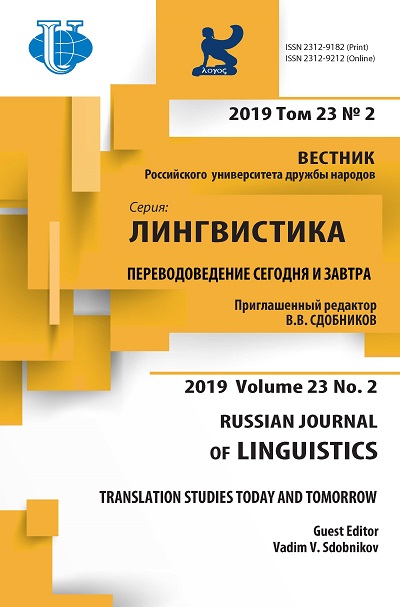Impact of technology on Translation and Translation Studies
- 作者: Gambier Y.1,2
-
隶属关系:
- University of Turku
- I. Kant Baltic Federal University
- 期: 卷 23, 编号 2 (2019): Translation studies today and tomorrow
- 页面: 344-361
- 栏目: 翻译
- URL: https://journals.rudn.ru/linguistics/article/view/21211
- DOI: https://doi.org/10.22363/2312-9182-2019-23-2-344-361
如何引用文章
全文:
详细
The landscape in translation and interpreting is changing deeply and rapidly. For a long time, but not necessarily everywhere, translation was denied as a need (except for the political and religious powers), as effort (translation being defined as a kind of mechanical work, as substitution of words), and as a profession (translators embodying a subaltern position). Technology is bringing in certain changes in attitudes and perceptions with regards international, multilingual and multimodal communications. This article tries to define the changes and their consequences in the labelling and characterisation of the different practices. It is organised in five sections: first, we recall that translation and interpreting are only one option in international relations; then, we explain the different denials of translation in the past (or the refusal to recognize the different values of translation). In the third section, we consider how and to what extent technology is transforming today practices and markets. The ongoing changes do not boil solely to developments in Machine Translation (which started in the 1960s): community, crowdsourced/collaborative translation and volunteer translation encompass different practices. In many cases, users provide their own translations, with or without formal qualifications in translation. The evolution is not only technical but also economic and social. In addition, the fragmentation and the diversity of practices do have an impact on a multi-faceted market. In the fourth section, we emphasize that there are nowadays different concepts of translation and competitive paradigms in Translation Studies. Finally, we tackle the organisational challenge of the field, since the institutionalisation of translation and Translation Studies cannot remain the same as when there was a formal consensus on the concept of translation.
作者简介
Yves Gambier
University of Turku; I. Kant Baltic Federal University
Email: yves.gambier@utu.fi
professor emeritus from the University of Turku (Finland), School of Languages and Translation Studies Fi-20014 Turun Yliopisto, Finland; 14, A. Nevskogo st., Kaliningrad, 236041, Russia
参考
- Brems, E., Meylaerts, R. & van Doorslaer, L. (eds.) (2012). The Knowns unknowns of Translation Studies. Target, 24 (1).
- Buzelin, H. (2014). How devoted can translators be? Revisiting the subservience hypothesis. Target, 26 (1), 63-97.
- Chesterman, A. (2006). Interpreting the meaning of translation. In M. Suominen et al (eds.). A man of measure: Festschrift in homage of Fred Karlsson on his 60th birthday. University of Helsinki.
- Delisle, J. & Woodsworth, J. (eds.) (2012). Translators through history (Revised edition) 1st ed. 1995. Amsterdam: John Benjamins.
- Doorslaer, L. van & Flynn, P. (eds.) (2011). Eurocentrism in Translation Studies. Translation and Interpreting Studies (TIS), 6 (2).
- Gambier, Y. (2003). Working with relay: An old story and a new challenge. In L. Perez González (ed.). Speaking in tongues: Language across contexts and users, 47-66. PU València.
- Gambier, Y. (2007a). Réseaux de traducteurs/interprètes bénévoles. Meta, 52 (4), 658-672.
- Gambier, Y. (2007b). Y-a-t-il une place pour une socio-traductologie? In M. Wolf & A. Fukari (eds.). Constructing a sociology of translation, 205-217. Amsterdam: John Benjamins.
- Gambier, Y. (2012). Le traducteur défiguré? In E. Skibínska & N. Paprocka (eds.). Figure(s) du traducteur. Wroklow: PU (coll.Romanica Wratislaviensia, vol. 59).
- Gambier, Y. & Stecconi, U. (eds.) (2019). A World Atlas of Translation. Amsterdam: John Benjamins.
- Gile, D. (2010). Why TS matter. In Gile D., Gyde H. & Pokorn, N. (eds.). Why Translation Studies matter, 251-261. Amsterdam: John Benjamins.
- Gouadec, D. (2002). Profession: Traducteur. Paris: La Maison du traducteur. In English (2007) Translator as a profession. Amsterdam: John Benjamins.
- Heilbron J. & G. Sapiro (éds.) (2002). Traduire: les échanges littéraires internationaux. Actes de la Recherche en Sciences Sociales, 144.
- House, J. (2003). English as a global lingua franca. In L. Perez Gonzáles (ed.). Speaking in tongues: Language across contexts and users, 19-46. PU València.
- Kalinowski, I. (2002). La vocation au travail de traducteur. Actes de la Recherche en Sciences sociales, 144, 47-54.
- Lambert, J. (1989). La traduction, les langues et la communication de masse. Les ambiguïtés du discours international. Target, 1 (2), 215-237.
- Mossop, B. (2006). Has computerization changed translation? Meta, 51 (4), 787-792.
- Pym, A. (2004). The Moving Text. Amsterdam: John Benjamins.
- Pym, A. (2009). Natural and directional equivalence in theories of translation. In Gambier, Y. & van Doorslaer, L. (eds.). The Metalanguage of Translation, 81-104. Amsterdam: John Benjamins.
- Pym A., Shlesinger, M. & Z. Jettmarová (eds.) (2006). Sociocultural aspects of translating and interpreting. Amsterdam: John Benjamins.
- Ray, R & N. Kelly (2010). Reaching new markets through Transcreation. When translation just isn’t enough. Common Sense Advisory.
- Reiss, K & Vermeer, H. (2013). Towards a general theory of translational action: Skopos theory explained. Manchester: St Jerome.
- Ribera JM, S. Hausmann-Muela, KP. Grietens & E.Toomer (2008). Is the use of interpreters in medical consultations justified? A critical review of the literature. (www.passs-international.org).
- Sapiro, G. (dir.) (2008). Transaltio. Le marché de la traduction en France à l’heure de la mondialisation. Paris: Ed.du CNRS.
- Sapiro, G. (dir.) (2009). Les contradictions de la globalization éditoriale. Paris: Nouveau Monde éditions.
- Simeoni, D. (1998). The pivotal status of the translator’s habitus. Target, 10 (1), 1-39.
- TAUS, Translation Automation User Society. https://www.taus.net/ (2013). Translation Technology Landscape Report. Online, 74 p.
- Toury, G. (1995/2012). Descriptive Translation Studies and Beyond. Amsterdam: John Benjamins.
- Tymoczko, M. (2005). Trajectories of research in TS, Meta 50 (4), 1082-1097.
- Tymoczko, M. (2007). Enlarging Translation, Empowering Translators. Manchester: St Jerome.
- Venuti, L. (2008). The Translator’s Invisibility. A History of Translation. London: Routledge. 1st ed. 1995, 3rd ed. 2018.














